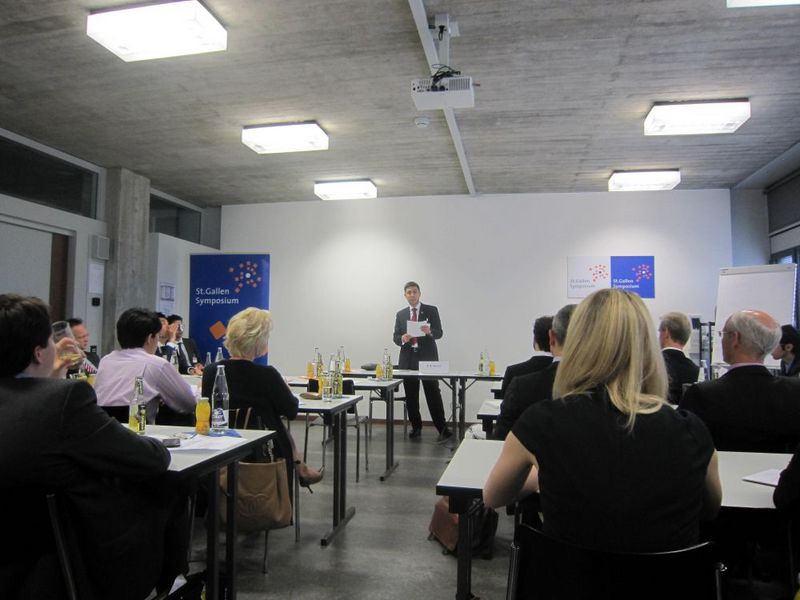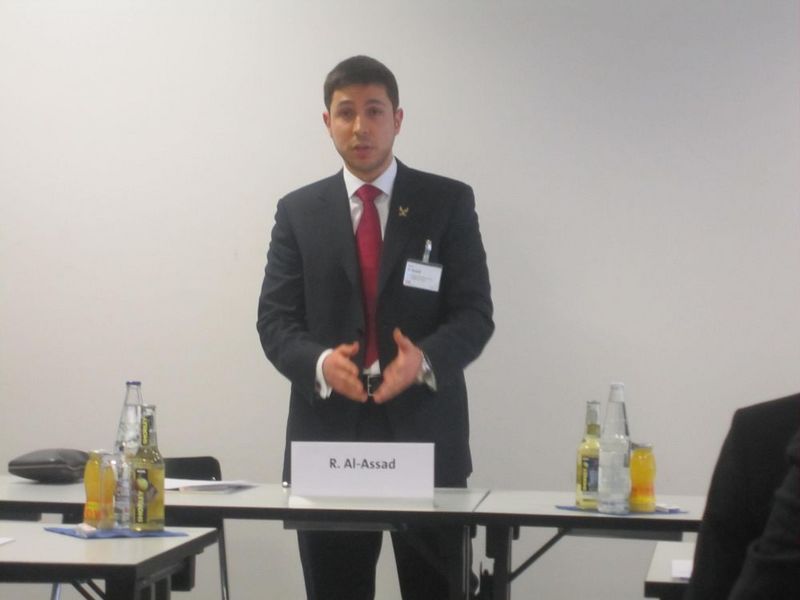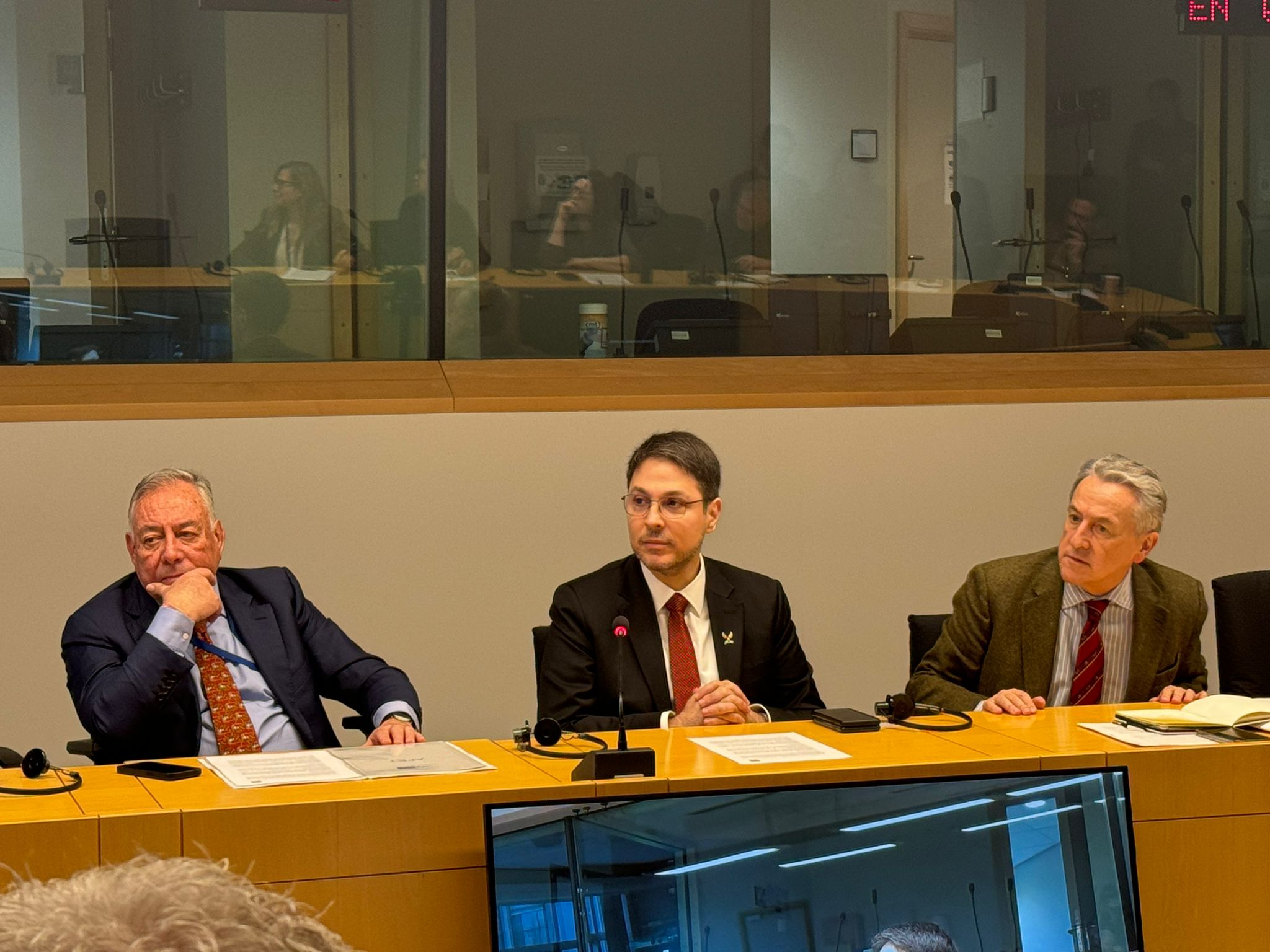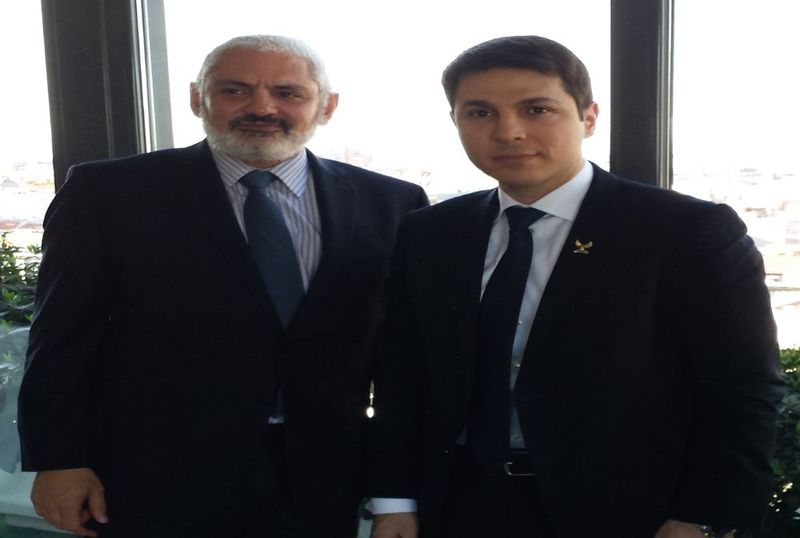Ribal Al-Assad, the Director of the ODFS, this week made a speech on Syria and the Arab Spring, at the 42st St. Gallen Symposium, Switzerland.The audience was made up of entrepreneurs, managers, politicians, academics, journalists, and decision-makers from civil society and students. The speech was well received and followed by a comprehensive Q & A session.
The St. Gallen Symposium aims to foster the intergenerational and intercultural dialogue between the Leaders of Today and the Leaders of Tomorrow. The 42nd symposium under the topic “Facing Risk” took place from 3–4 May 2012 at the University of St. Gallen.
Ribal Al-Assad made the following speech:
Good afternoon,
And thank you for that kind introduction.
My subject is my country Syria …
… and it’s inexorable slide …
… not just towards civil war …
… but as the focal point for a regional Arab conflict.
But I would like to begin in Burma.
Burma is also under the control of a military dictatorship.
Ethnic persecution has been rife.
Uprisings have been crushed.
The future for its majority of peaceful citizens has long-looked bleak.
However, the opposition of Aung San Suu Kyi …
… has just contested and won 44 out of 45 seats in free elections for the lower house.
Her resistance has been peaceful …
… and successfully backed by international sanctions.
Change in Burma may be incremental.
But the world has proved that the apparently impossible is possible …
… through a unified, inclusive and patient opposition …
… that is prepared to effect change through the managed transition from one-party to multi-
party rule.
Before I move on to Syria and the Middle East …
… I should address the issue of my surname.
‘Al Assad’ is not a name that immediately wins you many friends!
But it has also afforded me an unparalleled insight into events in Syria and the Middle East.
And it opens doors for me to give what I hope will be a more balanced and objective view of
events in my country than you may have read elsewhere.
For the record, I am no apologist for the incumbent regime …
… and for that reason I remain in exile from my native Syria.
Unlike Bashar Al-Assad I believe that the only route to a peaceful future for Syria …
… is democracy.
This was why I founded ‘the Organisation for Democracy and Freedom in Syria’ before the Arab Spring began.
And why I fear that the lack of a united opposition …
… or a true global understanding of the sinister forces influencing developments in my
country …
… could destroy it.
War, as you will have seen in the news …
… is an inevitability.
Guns from both sides have already broken the UN ceasefire.
Government and opposition forces have committed terrible atrocities.
The route from dictatorship to democracy is never easy.
But in Syria’s case …
… the journey has not even started.
This is not how the world’s press predicted things would turn out when …
… a year and a half ago …
… a 26 year old Tunisian graduate named Mohammed Bouazizi set himself on fire …
… sparking the first fuse of the ‘Arab Spring’.
We read of peaceful marches …
… and predictions of sweeping regime change in the manner of Eastern Europe two decades ago.
The word ‘Spring’ suggested a youthful, liberal and upbeat revolution.
In practise, and with minor exceptions …
… it has unleashed much darker forces …
… fuelled by the age-old regional cancer of sectarian hatred.
In Egypt …
… revolution was resolved internally …
… but the Muslim Brotherhood and the extremist Salafi party have sprung to the fore at the
ballot box … leaving the Coptic Christian minority in terror.
Libya’s ‘Spring’ required foreign intervention …
… but here too, the outcome has been chaotic and frightening.
Militia groups rule the streets …
… last month, local leaders in Benghazi proclaimed an independent ‘State of Cyrenaica’.
In mid-April the Prime Minister was attacked in his own office.
As Henry Kissinger has pointed-out …
… the more sweeping the destruction of the existing order …
… the greater the risk of fragmentation of society …
… and the higher the risk of the disaffected seeking refuge in the arms of extremists.
This is not simply due to the internal cultural and political mix within each individual country.
It owes much to vested interests from abroad.
Because the key players in the region are not only anti-democratic …
… they also stand to benefit from an increase in sectarian divisions and extremism.
Much of this sentiment stems from Saudi Arabia and Qatar …
… two of the richest and most prominent players in the Arab League.
They are absolute monarchies …
… whose greatest fear is the arrival of a democratic tide across the region.
As a result, they pay lip service to democracy abroad, but act to undermine it.
Their influence in the region is increasingly aggressive.
Saudi-owned WISAL and SAFA satellite TV stations …
… have screened extremist clerics exhorting fundamentalists to, and I quote:
“Mince the minorities who are not with us and feed them to the dogs”.
They are deliberately inciting sectarian hatred.
This is not the language of a ‘Spring’.
And nor are the words of the Grand Mufti of Saudi Arabia …
… the highest authority in Islam …
… exhorting Islamists to destroy churches across the region.
This support for extremism is not just rhetorical.
Saudis and Qataris are investing petro dollars to accelerate the cross-border arms flow into
the unstable nations emerging from the ‘Spring’.
But why?
Context can be found in the ever-growing sectarian-fuelled enmity between Turkey and Iran.
Turkey is growing fast …
… is economically powerful …
… and is looking to develop its own power-base across the Middle East.
Iran, whose own ‘Green Revolution’ was put-down mercilessly …
… sits in an ever-growing state of isolation …
… with tentacles reaching into Syria, Iraq, Lebanon and Bahrain.
She is desperate to retain her strategic power-bases and regional leadership.
This leaves a Tehran-led Shia axis forming through Baghdad, Beirut and Damascus …
… squaring up to Turkish-led Sunni axis encompassing Riyadh, Doha and their followers.
Tensions are growing across the region …
… and Syria’s state of internal strife …
… allied to its strategic importance …
… has attracted the wrong sort of intervention from both sides.
I shall return to these sectarian alliances.
But even they do not complete the context.
Because Syria has also provided a platform for the ever growing tensions between Russia
and China against the US and NATO.
In Moscow, President Medvedev has warned that time is running out for the West to secure
Russia’s agreement to a missile defence shield in Europe.
Beijing, meanwhile, has reacted to what it perceives to be a US policy of encirclement …
… has been fighting an economic war through currency protectionism.
And so with the US delegating it’s regional responsibilities to Ankara …
… Iran has turned to Russia and China for support.
Extremism in Chechnya, Dagestan and parts of China gives them every reason to fear Islamism.
And so the foundations of an alliance are in place.
The recent arrival of the The Smetlivy, a Russian guided-missile destroyer, at the Syrian port
of Tartus …
… did little to diffuse the rising temperature in the Eastern Mediterranean.
Nor has Moscow’s supply of three million gas masks and 72 shore to seas missiles to Syria.
Which brings me back to my country.
Where the superpowers have also been flexing their muscles diplomatically …
… as the world witnessed in the Russo-Chinese veto of the draft Security Council resolution
calling on President Assad to step down.
Iran, Russia and China have subsequently hardened their support for the status quo.
The US and Turkish-led axis back change, despite its potential consequences.
As democrats, we all abhor the Syrian regime’s barbarity.
We yearn for change.
But if recent events across Iraq, Afghanistan, Libya and Egypt have taught us anything …
… it is that enforcing change is relatively straightforward …
… but controlling its consequences is not.
The next phase is crucial.
And as Burma demonstrates …
… it requires a widely-backed, peaceful and appropriate opposition.
This is particularly true in Syria …
… 45% of whose people are represented by ‘minority’ groups, including Druzes, Shias, Alawites,
Ismailis, Christians, Jews, Kurds, Turkmen, Circassians and Armenians …
… many of whom fear the incumbent regime less than its opposition.
Those people need representation.
But the Syrian National Council (the SNC) …
… is not representing them.
Nor are some of the most influential members of the Arab League …
… whose modus operandi is not just undemocratic …
… but driven by the same sectarian issues that have driven so much of the violence inside
Syria and beyond.
You will all have read about the ‘Friends of Syria’ conferences in Tunis, Istanbul and Paris.
You may have assumed that they were inclusive and moderate …
… backed, as they have been, by the progressive international community …
… including Hilary Clinton who stressed the need for an inclusive, democratic, peaceful transition.
Your assumption would be understandable.
But in practise it could not be less inclusive, democratic or peaceful.
For a start, the hosts have excluded many peaceful opposition groups including our own …
… despite regular and increasingly urgent requests to attend.
In our absence, the Saudis and Qataris pooled agreement for a formalized pay structure for
the Free Syrian Army (FSA) …
… and discussed official arms supplies to the armed opposition …
… just a week after the Annan plan was agreed by the International Community!
This was hardly peaceful.
In this context, it may not surprise you to hear that the SNC …
… although recognised by “The Friends of Syria” …
… has been described by Kamal Al-Labwani …
… a prominent opposition leader and SNC member …
… as: “an opposition under the cloak of fanatics hiding behind a veneer of stupid liberals” …
… and, more worryingly …
… “a façade for the Muslim Brotherhood.”
He also mourned the direction of the Syrian ‘Spring’:
“away from “democracy and modernity … towards a renewed form of religious despotism.”
This is not democratic. Or peaceful.
Sadly, Mr. Al-Labwanis sentiments are echoed by the Ali Sadreddine Bayanouni …
… the leader of the Syrian Muslim Brotherhood …
… who has proudly highlighted the SNC’s Islamist credentials …
… and explained how it’s leader Burhan Ghalioun was appointed, and I quote:
“We have chosen this figure that is accepted in the West and at home to prevent
the regime from capitalizing on the presence of an Islamist at the top of the Syrian National Council.
As for this man, he is different from us with respect to political thought and ideas.”
The U.S. Director of National Intelligence James Clapper, meanwhile, …
… has described the Syrian opposition as fractured, “not a national movement” and “infiltrated by al Qaeda”.
This is hardly a moderate or inclusive opposition.
Its answer to the regime insisting on Baath Party membership as a precursor to sympathetic
treatment and employment …
… is to propose exluding all two million members …
… an approach that is fundamentally at odds with any semblance of democracy.
It seems that nothing has been learned from the lesson of Iraq.
And so the SNC reflects the sectarian interests of the Turkish-led axis.
It is not democratic.
It is not peaceful.
It is not inclusive.
It leaves the peaceful Syrian majority unrepresented …
… and war as a preferred outcome.
All this means we are dealing with three-tiers of conflict:
1) The Syrian regime against its opposition …
2) the Iranian-led Shia axis supporting the regime …
… against the Turkish-led Sunni axis agitating for change.
3) With China and Russia backing the former …
… and the US and Nato supporting Turkey.
Which explains why Turkey watches its border with Syria with guns trained.
Why President Erdogan’s and Iraqi Prime Minister Maliki …
… attack each other with accusations of sectarian rhetoric.
Why the Syrian President has warned Turkey that its missiles are trained on Ankara and Istanbul.
Why Western spy satellites have picked-up Syrian chemical warheads being moved towards
the Turkish border in broad daylight.
Why Saudi and Qatar are arming and funding parts of the Syrian opposition.
Why Ayatollah Ali Khamenei has said that Iran will defend Syria against any attack or
adversary.
Why Russia’s naval presence remains outside Tartus.
Why the US has increased its aid to the Syrian opposition to $25 million …
… funding night-vision goggles and satellite communications.
And why the US, Russia and China look-on, happy to see their proxy battles fought away from home soil.
All of which throws into stark contrast the position of Kofi Annan and the UN.
Annan points out the requirement for peaceful dialogue on a deal for transition from within.
Like Burma.
Secretary of State Clinton, Prime Minister Cameron and President Sarkosy have all agreed.
But their support for the SNC is entirely contradictory.
Arming any opposition heightens the temperature.
Arming an opposition cited by Human Rights Watch for committing public acts of torture and
abuse …
… unlocks the last barrier to war.
I began in Burma where change is incremental.
It requires patience.
It requires international unity.
It requires co-operation with the existing regime despite its moral repugnancy.
The Burmese regime remains in power, which may not be ideal …
… but it is pragmatic and relatively peaceful.
It avoids a power vacuum …
… and facilitates a transition to democracy.
It involves an ethical sacrifice …
… but not a human one.
This has to be the best outcome for the Syrian people.
Diplomacy may not offer Syria a great chance of a peaceful transition …
… but it is the only chance.
And it is why my ‘Organisation for Freedom and Democracy in Syria’ has published our own five point plan to maximise the chances of a peaceful future.
Firstly the opposition must act in a way that is inclusive and representative of the
Syrian people by creating a platform where all parties can come together and speak with a single voice.
Secondly, it must work peacefully with the international community with the aim of non-violent regime change.
Thirdly, international funding must be channelled solely toward facilitating peace
through humanitarian aid and training into the best ways to form civil groups and political parties.
Fourthly, non-aligned states should be encouraged to help facilitate and encourage the
journey towards political pluralism.
Finally, and only once it can display real unity, can this internationally-backed,
democratic opposition take on the regime by campaigning for a genuinely pluralistic election.
We have a choice to make.
Between the sectarian and the moderate.
Between haste and patience.
Between the immediate goal and the long-term strategy.
It may be too late.
But it may not.
It’s a risk worth taking.
Syria harbours a colourful mosaic of ethnicities, cultures and faiths.
It’s people provide the only opportunity to counter extremism and live in a cosmopolitan and liberal environment.
The alternative is war.
And not just a civil war …
… but a regional war in which age-old sectarian interests coincide with twenty first century global tensions.
I have feared it for many years.
I have warned against it since the start of the Arab Spring.
And I urge you all to spread the word …
… on behalf of every peace-loving democrat.
Grazie.




